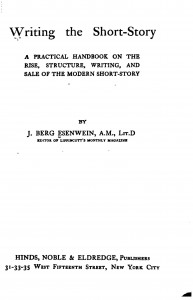Follow Scott
Recent Tweets
- Waiting for Twitter... Once Twitter is ready they will display my Tweets again.
Latest Photos
Search
Tags
anniversary Balticon birthdays Bryan Voltaggio Capclave comics Cons context-free comic book panel conventions DC Comics dreams Eating the Fantastic food garden horror Irene Vartanoff Len Wein Man v. Food Marie Severin Marvel Comics My Father my writing Nebula Awards Next restaurant obituaries old magazines Paris Review Readercon rejection slips San Diego Comic-Con Scarecrow science fiction Science Fiction Age Sharon Moody Stan Lee Stoker Awards StokerCon Superman ukulele Video Why Not Say What Happened Worldcon World Fantasy Convention World Horror Convention zombies
©2025 Scott Edelman
Writing advice from 1908—Part VII
Posted by: Scott
Tags:
old magazines
Posted date:
March 1, 2008 |
No comment
If you can’t figure out the proper length for your current short story, Dr. J. Berg Esenwein has some advice for you in his book Writing the Short-Story: A Practical Handbook on the Rise, Structure, Writing and Sale of the Modern Short-Story. So pay careful attention … as long, that is, as you’re planning to mail that story to one of the better magazine markets of 1908!
Here what he has to say:
As for … the length of short-stories, styles change as they do with coats—sometimes they are worn longer, and again shorter. The average length in the time of Irving, Hawthorne and Poe was little short of ten thousand words. Nowadays, editors would think Poe’s limit too long when he declared that, “If any literary work is too long to be read at one sitting, we must be content to dispense with the immensely important effect derivable from unity of impression—for, if two sittings be required, the affairs of the world interfere, and everything like totality is at once destroyed.”
The French masterpieces average about 5,000 words, with some of the choicest reaching barely 3,000. The British writers affect a limit of 6,000, German and Russian stories run to 8,000, while American writers usually keep within 5,000, with the average reaching no more than 3,500. All in all, from 2,000 to 10,000 words is a fair statement of length, with some few even shorter or longer.
Each magazine has its own length-limits, which you would do well to ascertain., Few periodicals accept short stories of more than 5,000 words.
The average short-story masterpiece, if we exclude those of Maupassant and Daudet, is longer than the average short-story. The expert often dares a broader canvas, and works in his detail more interestingly, than does the beginner. Even his name seems to warrant a somewhat longer story—just as we listen rapt for an hour to a famous lecturer, and yawn over unadvertised eloquence that flows for more than thirty minutes at a stretch.
“The Insurgent,” by Halévy, has 2,000 words; “The Siege of Berlin,” Daudet, 2,750 words; “A Passion in the Desert,” Balzac, 3,000; “Tennessee’s Partner,” Harte, 4,000; “Valia,” Andreiev, 5,000; “Next to Reading Matter,” “O. Henry,” (sic) 6,000, “The Wind in the Rose Bush,” Mary Wilkins Freeman, 6,750, “A Scandal in Bohemia,” Doyle, 7,750; “Who Was She?” Bayard Taylor, 8,000; “The Fall of the House of Usher,” Poe, 8.000; “The Corpus Delecti,” Melville D. Post, 10,750; “Will o’ the Mill,” Stevenson, 11,500; “The Gentle Boy,” Hawthorne, 12,000; “The Gold Bug,” Poe, 13,000; “The Man Who Would Be King,” Kipling, 13,750; “The Liar,” Henry James, 20,000.
Examining the masterpieces mentioned in that last paragraph …
How many of the authors have you heard of? How many of the stories have you heard of? How many of the stories have you actually read?
For me, the numbers dwindle from 10 to 5 to 3.

